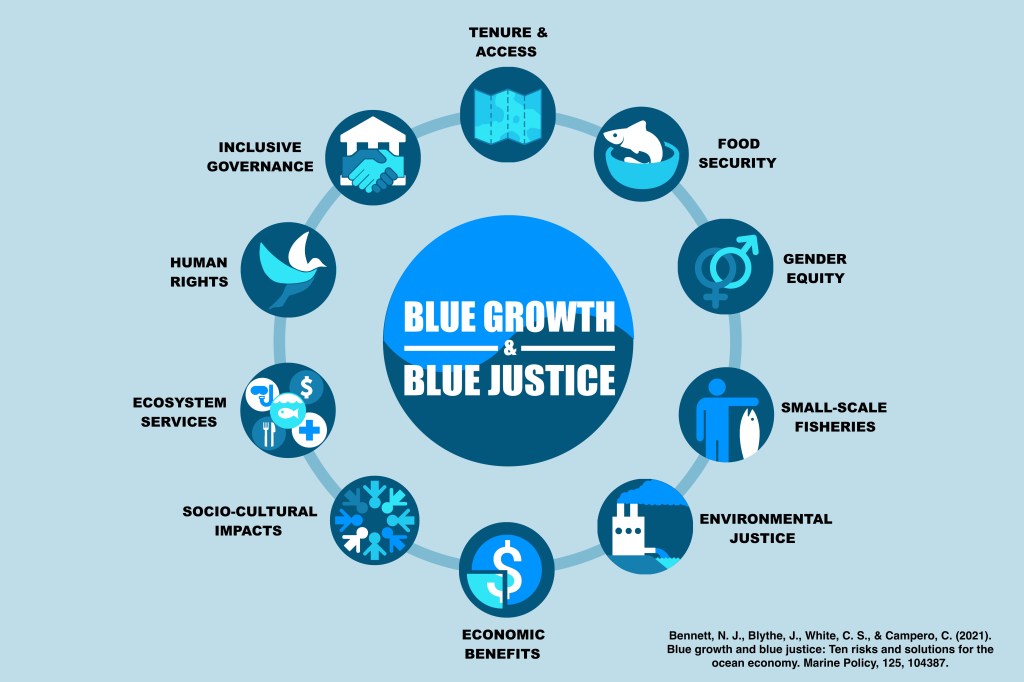Tag Archives: environmental justice
New Paper – Blue Growth and Blue Justice: Ten risks and solutions for the ocean economy

Rapid and unchecked economic development in the ocean can produce substantial risks for people and the environment. But, what harms or social injustices might be produced by the ocean economy? This is the question that we examine in our new paper “Blue growth and blue justice: Ten risks and solutions for the ocean economy” published today in Marine Policy. Through this critical analysis, our aim is to stimulate a rigorous dialogue on how to achieve a more just and inclusive ocean economy.
Abstract: The oceans are increasingly viewed as a new frontier for economic development. Yet, as companies and governments race to capitalize on marine resources, substantial risks can arise for people and the environment. The dominant discourse that frames blue growth as beneficial for the economy, developing nations, and coastal communities risks downplaying the uneven distribution of benefits and potential harms. Civil society organizations and academics alike have been sounding the alarm about the social justice implications of rapid and unchecked ocean development. Here, we review existing literature to highlight ten social injustices that might be produced by blue growth: 1) dispossession, displacement and ocean grabbing; 2) environmental justice concerns from pollution and waste; 3) environmental degradation and reduction of ecosystem services; 4) livelihood impacts for small-scale fishers; 5) lost access to marine resources needed for food security and well-being; 6) inequitable distribution of economic benefits; 7) social and cultural impacts; 8) marginalization of women; 9) human and Indigenous rights abuses; and, 10) exclusion from governance. Through this critical review, we aim to stimulate a rigorous dialogue on future pathways to achieve a more just and inclusive ocean economy. We contend that a commitment to ‘blue justice’ must be central to the blue growth agenda, which requires greater attention to addressing the 10 risks that we have highlighted, and propose practical actions to incorporate recognitional, procedural, and distributional justice into the future ocean economy. However, achieving a truly just ocean economy may require a complete transformation of the blue growth paradigm.
Reference: Bennett, N. J., Blythe, J., White, C. S., & Campero, C. (2021). Blue growth and blue justice: Ten risks and solutions for the ocean economy. Marine Policy, 125, 104387. https://www.sciencedirect.com/science/article/pii/S0308597X20310381
An open access pre-print of the paper is also available at this link: https://fisheries.sites.olt.ubc.ca/files/2020/06/Take2-2020-02-WP_Blue-Growth-and-Blue-Justice-IOF-Working-Paper.pdf
If you prefer to watch a video: https://youtu.be/Snhl355oJnA
New Paper: Just Transformations to Sustainability

A group of co-authors and I have published a new open access paper titled Just Transformations to Sustainability (Link to PDF). In this paper, we argue that sustainability transformations cannot be considered a success unless social justice is a central concern. Here, we define just transformations as “radical shifts in social–ecological system configurations through forced, emergent or deliberate processes that produce balanced and beneficial outcomes for both social justice and environmental sustainability.” We also provide a framework that highlights how recognitional, procedural and distributional justice can be taken into account to navigate just transformations in environmental sustainability policies and practice.
New article: An appeal for a code of conduct for marine conservation

A group of colleagues and I have just published an open access paper titled “An appeal for a code of conduct for marine conservation” in Marine Policy. In this paper, we propose that:
- Poor governance and social issues can jeopardize the legitimacy of, support for and long-term effectiveness of marine conservation.
- A comprehensive set of social standards is needed to provide a solid platform for conservation actions.
- This paper reviews key principles and identifies next steps in developing a code of conduct for marine conservation.
- The objectives of a code of conduct are to promote fair, just and accountable marine conservation.
- A code of conduct will enable marine conservation to be both socially acceptable and ecologically effective.
Abstract: Marine conservation actions are promoted to conserve natural values and support human wellbeing. Yet the quality of governance processes and the social consequences of some marine conservation initiatives have been the subject of critique and even human rights complaints. These types of governance and social issues may jeopardize the legitimacy of, support for and long-term effectiveness of marine conservation. Thus, we argue that a clearly articulated and comprehensive set of social standards – a code of conduct – is needed to guide marine conservation. In this paper, we draw on the results of an expert meeting and scoping review to present key principles that might be taken into account in a code of conduct, to propose a draft set of foundational elements for inclusion in a code of conduct, to discuss the benefits and challenges of such a document, and to propose next steps to develop and facilitate the uptake of a broadly applicable code of conduct within the marine conservation community. The objectives of developing such a code of conduct are to promote fair conservation governance and decision-making, socially just conservation actions and outcomes, and accountable conservation practitioners and organizations. The uptake and implementation of a code of conduct would enable marine conservation to be both socially acceptable and ecologically effective, thereby contributing to a truly sustainable ocean.
Press releases and coverage
- Code of conduct needed for ocean conservation, study says – Eureka Alert
- Does marine conservation need a “Hippocratic Oath”? – CBC
- Marine conservation must consider human rights – Nereus Program
Policy Brief: An appeal for a code of conduct for marine conservation (PDF LINK)
Reference: Bennett, N.J., Teh, L., Ota, Y., Christie, P., Ayers, A., Day, J.C., Franks, P., Gill, D., Gruby, R.L., Kittinger, J.N., Koehn, J.Z., Lewis, N., Parks, J., Vierros, M., Whitty, T.S., Wilhelm, A., Wright, K., Aburto, J.A., Finkbeiner, E.M., Gaymer, C.F., Govan, H., Gray, N., Jarvis, R.M., Kaplan-Hallam, M. & Satterfield, T. (2017). An appeal for a code of conduct for marine conservation. Marine Policy, 81, 411–418. https://doi.org/10.1016/j.marpol.2017.03.035 [OPEN ACCESS]
